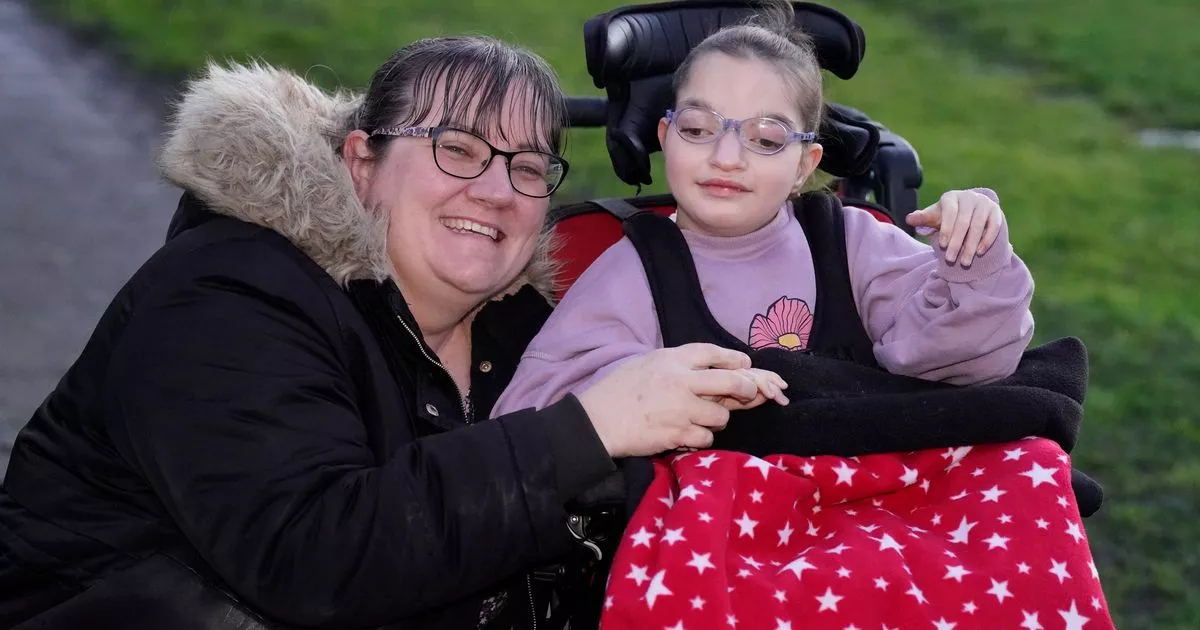A mother who provides 24-hour carer for her four disabled children is calling for a No vote in the care referendum, saying proposed changes give families no rights.
Samantha Kenny, from County Kildare, said the wording meant her children and others were “left to shoulder the burden of care”. She said the wording, which allows care between family members, did not recognise her children’s independence and right to choice.
Samantha is the mother of four children, ages 18, 16, 12 and 8. She is the full-time parent of her youngest child, Ava, who has Wolf-Hirschhorn Syndrome.
Read more – Elon Musk accused of ‘interfering’ with referendum by supporting Conor McGregor’s post
“We have people in our family with all sorts of disabilities, from learning disabilities to neurodevelopmental disorders to physical disabilities,” Ms Kenny told the PA news agency. “I’ve been a carer for the last 10 years and am currently doing a university course because the rising cost of living means I will have to go back to work whether I like it or not.”
“Ava has the most complex condition, the highest care needs, the most contact with various state agencies and organizations, and is the one I have had to fight for the hardest. Wolf-Hirschhorn Syndrome has affected her in every way imaginable. She is in a wheelchair full time. She has epilepsy, heart disease, hearing loss and cortical visual impairment. She has poor muscle tone and a hole in her heart. And she is a legend.
“She doesn’t communicate verbally, but with three siblings she has the perfect side-glance and knows exactly how to get what she wants, when she wants it, so no words are needed. We literally do everything for Ava. She can’t even get out of bed without support, she needs help eating, she needs help with every aspect of life. She can’t do anything on her own, but we are working on it. She needs 24-hour care, seven days a week.”
Samantha Kenny is mum to four children, including eight-year-old Ava, who has Wolf-Hirschhorn syndrome and complex needs. Samantha is her full-time carer. She is calling for a No vote in the care referendum (Photo: Neil Carson/PA Wire)
Families receive outside help for 10 hours each week and one weekend each month. “The level of care you receive is not determined by need but by where you live and the services they can provide,” Samantha added.
The County Kildare woman said she had “huge problems” with the proposed wording.
Two referendums proposing changes to the Irish Constitution are being held on March 8th. The Family Amendment proposes to go beyond the meaning of family defined by marriage to include families based on “permanent” relationships.
The Caregiving Amendment proposes removing references to women’s roles and responsibilities in the home and instead adding new provisions recognising family caregivers.
Samantha said she doesn’t want to keep the current language, but will vote against the amendment.
“The new law does nothing to protect me. It makes Ava a burden to care for,” she added. “Her rights, independence, choices and everything else doesn’t matter because her care is based on whether her family can support her.”
“There’s nothing mentioned about the community, there’s nothing mentioned about the state providing that care. They’re just going to ‘make an effort’ to support the care that we’re providing.”
“So they’re not providing care either. Ava has become the burden of care. I hear they’re trying to get rid of sexist language. I’m a female carer and I’m being told I have no choice but to care for my loved one whether I want to or not, because her care is now mandated by the family.”
“Sixty percent of caregivers are women, so I don’t understand why we should remove the word ‘women’ from the constitution and replace it with the word ‘caregivers’.”
“Just because 40 percent are men doesn’t mean that 60 percent don’t exist. There are women with disabilities, and even girls with disabilities, and it’s a constitutional duty to provide care, so how can you say it’s not sex discrimination?”
Mr Kenney was also critical of the Opposition, who have argued for a Yes vote in the care referendum but have expressed concerns about the proposed wording.
Some political parties, including Labour, Sinn Féin and the Social Democrats, criticised the government for choosing not to use the wording as recommended by the Citizens’ Consultation on Gender Equality.
The group recommended replacing the language with gender-neutral language and “requiring states to take reasonable steps to support caregiving within the home and throughout the community.”
“If they have a problem with the language, they shouldn’t vote for it, that’s it,” Kenney added. “They have an opportunity now to say no and demand better language. They’ve done that in the past.”
“Everyone has the potential to be a caregiver or be a caregiver. Anyone can have an accident or simply get older, which puts them at risk of being a caregiver or becoming a caregiver for someone else.”

